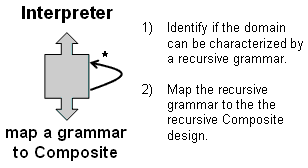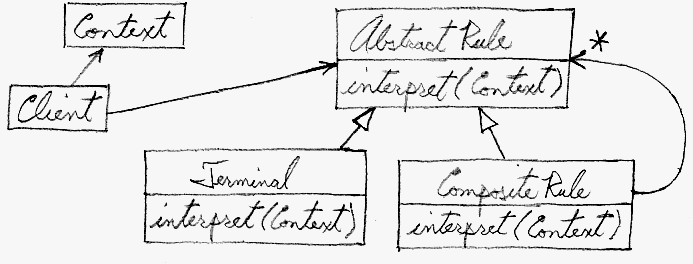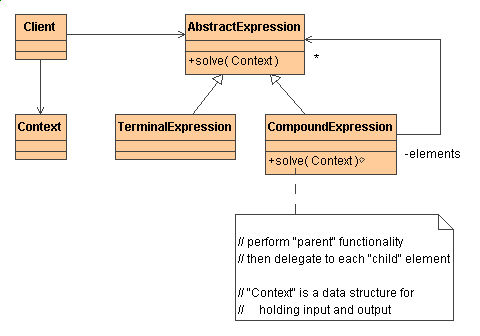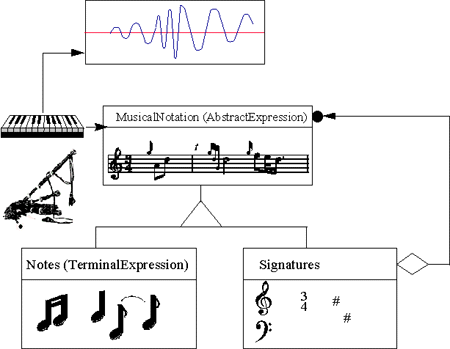

An abstract base class specifies the method interpret(). Each concrete subclass implements interpret() by accepting (as an argument) the current state of the language stream, and adding its contribution to the problem solving process.



interpret(Context) method in the Composite
hierarchy.
Context object encapsulates the current state of
the input and output as the former is parsed and the latter is
accumulated. It is manipulated by each grammar class as the
"interpreting" process transforms the input into the output.
| Before | After | |
|---|---|---|
// This is an adaptation of a design that appeared in a Pascal
// data structures book. The intent was to use stacks to convert
// normal "infix" syntax into "postfix" notation with operator
// precedence already handled.
public class InterpreterDemo {
public static boolean precedence( char a, char b ) {
String high = "*/", low = "+-";
if (a == '(') return false;
if (a == ')' && b == '(') {
System.out.println( ")-(" );
return false;
}
if (b == '(') return false;
if (b == ')') return true;
if (high.indexOf( a ) > -1 && low.indexOf( b ) > -1)
return true;
if (high.indexOf( a ) > -1 && high.indexOf( b ) > -1)
return true;
if (low.indexOf( a ) > -1 && low.indexOf( b ) > -1)
return true;
return false;
}
public static String convert_to_postfix( String expr ) {
Stack<Character> op_stack = new Stack<Character>();
StringBuffer out = new StringBuffer();
String opers = "+-*/()";
char top_sym = '+';
boolean empty;
String[] tokens = expr.split( " " );
for (int i = 0; i < tokens.length; i++)
if (opers.indexOf( tokens[i].charAt(0) ) == -1) {
out.append( tokens[i] );
out.append( ' ' );
} else {
while ( ! (empty = op_stack.isEmpty())
&& precedence( top_sym = op_stack.pop(),
tokens[i].charAt(0))) {
out.append( top_sym );
out.append( ' ' );
}
if ( ! empty)
op_stack.push( top_sym );
if (empty || tokens[i].charAt(0) != ')')
op_stack.push( tokens[i].charAt(0) );
else
top_sym = op_stack.pop();
}
while ( ! op_stack.isEmpty()) {
out.append( op_stack.pop() );
out.append( ' ' );
}
return out.toString();
}
public static double process_postfix( String postfix,
HashMap<String,Integer> map ) {
Stack<Double> stack = new Stack<Double>();
String opers = "+-*/";
String[] tokens = postfix.split( " " );
for (int i=0; i < tokens.length; i++)
// If token is a number or variable
if (opers.indexOf( tokens[i].charAt(0) ) == -1) {
double term = 0.;
try {
term = Double.parseDouble( tokens[i] );
} catch (NumberFormatException ex) {
term = map.get( tokens[i] );
}
stack.push( term );
// If token is an operator
} else {
double b = stack.pop(), a = stack.pop();
if (tokens[i].charAt(0) == '+') a = a + b;
else if (tokens[i].charAt(0) == '-') a = a - b;
else if (tokens[i].charAt(0) == '*') a = a * b;
else if (tokens[i].charAt(0) == '/') a = a / b;
stack.push( a );
}
return stack.pop();
}
public static void main( String[] args ) {
String infix = "C * 9 / 5 + 32";
String postfix = convert_to_postfix( infix );
System.out.println( "Infix: " + infix );
System.out.println( "Postfix: " + postfix );
HashMap<String,Integer> map =
new HashMap<String,Integer>();
for (int i=0; i <= 100; i += 10) {
map.put( "C", i );
System.out.println( "C is " + i + ", F is "
+ process_postfix( postfix, map ) );
} } }
// Infix: C * 9 / 5 + 32
// Postfix: C 9 * 5 / 32 +
// C is 0, F is 32.0
// C is 10, F is 50.0
// C is 20, F is 68.0
// C is 30, F is 86.0
// C is 40, F is 104.0
// C is 50, F is 122.0
// C is 60, F is 140.0
// C is 70, F is 158.0
// C is 80, F is 176.0
// C is 90, F is 194.0
// C is 100, F is 212.0
|
// This is a refactoring that follows the intent of the Inter-
// preter design pattern. All classes in the Operand hierarchy:
// implement the evaluate(context), digest some piece of the
// context argument, and return their contribution to the recur-
// sive traversal. Applying the Interpreter pattern in this
// domain is probably inappropriate.
interface Operand {
double evaluate( HashMap<String,Integer> context );
void traverse( int level );
}
class Expression implements Operand {
private char m_operator;
public Operand left, rite;
public Expression( char op ) { m_operator = op; }
public void traverse( int level ) {
left.traverse( level+1 );
System.out.print( "" + level + m_operator + level + " " );
rite.traverse( level+1 );
}
public double evaluate( HashMap<String,Integer> context ) {
double result = 0.;
double a = left.evaluate( context );
double b = rite.evaluate( context );
if (m_operator == '+') result = a + b;
else if (m_operator == '-') result = a - b;
else if (m_operator == '*') result = a * b;
else if (m_operator == '/') result = a / b;
return result;
} }
class Variable implements Operand {
private String m_name;
public Variable( String name ) { m_name = name; }
public void traverse( int level ) {
System.out.print( m_name + " " );
}
public double evaluate( HashMap<String,Integer> context ) {
return context.get( m_name );
} }
class Number implements Operand {
private double m_value;
public Number( double value ) { m_value = value; }
public void traverse( int level ) {
System.out.print( m_value + " " );
}
public double evaluate( HashMap |
Interpreter can use State to define parsing contexts. [GoF, p349]
The abstract syntax tree of Interpreter is a Composite (therefore Iterator and Visitor are also applicable). [GoF, p255]
Terminal symbols within Interpreter's abstract syntax tree can be shared with Flyweight. [GoF, p255]
The pattern doesn't address parsing. When the grammar is very complex, other techniques (such as a parser) are more appropriate. [GoF, p247]